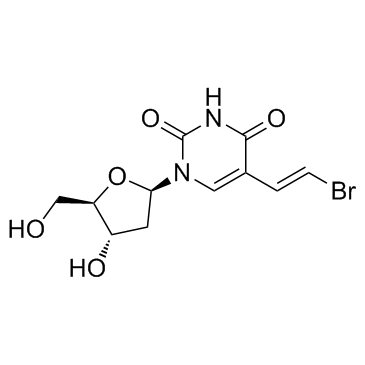Interaction between capecitabine and brivudin in a patient with breast cancer.
José M Baena-Cañada, María J Martínez, Obdulia García-Olmedo, Reyes Jiménez-Bárcenas, Pedro Muriel-Cueto
Index: Nat. Rev. Clin. Oncol. 7(1) , 55-8, (2010)
Full Text: HTML
Abstract
A 66-year-old woman with metastatic mammary carcinoma, who was being treated with capecitabine, contracted a herpes zoster infection that was treated with the antiviral drug brivudin. A drug-drug interaction between brivudin and capecitabine caused medullar aplasia, serious toxic effects to the intestinal mucous membrane, hand-foot syndrome, onycholysis and dental pigmentation.Physical examination, blood analysis, blood cultures, chest X-ray, bone marrow aspiration and biopsy.Serious adverse event secondary to inhibition of dihydropyrimidine dehydrogenase by a drug-drug interaction between capecitabine and brivudin.Intravenous hydration, imipenem, red blood cell and platelet transfusions, filgrastim, omeprazole, care of the mouth and feet, topical anesthetics, systemic analgesics and parenteral nutrition.
Related Compounds
| Structure | Name/CAS No. | Molecular Formula | Articles |
|---|---|---|---|
 |
Brivudine
CAS:69304-47-8 |
C11H13BrN2O5 |
|
Characterization of pyrimidine nucleoside phosphorylase of M...
2012-07-01 [Biochem. J. 445(1) , 113-23, (2012)] |
|
Synthesis of nucleoside-based antiviral drugs in ionic liqui...
2008-10-15 [Bioorg. Med. Chem. Lett. 18(20) , 5640-2, (2008)] |
|
Retained sensitivity to cytotoxic pyrimidine nucleoside anal...
2010-01-01 [Nucleosides Nucleotides Nucleic Acids 29(1) , 1-13, (2010)] |
|
Phenotypic and genetic characterization of varicella-zoster ...
2011-08-01 [Med. Microbiol. Immunol. 200(3) , 193-202, (2011)] |
|
5-Bromovinyl 2'-deoxyuridine phosphorylation by mitochondria...
2008-06-01 [Nucleosides Nucleotides Nucleic Acids 27(6) , 858-62, (2008)] |